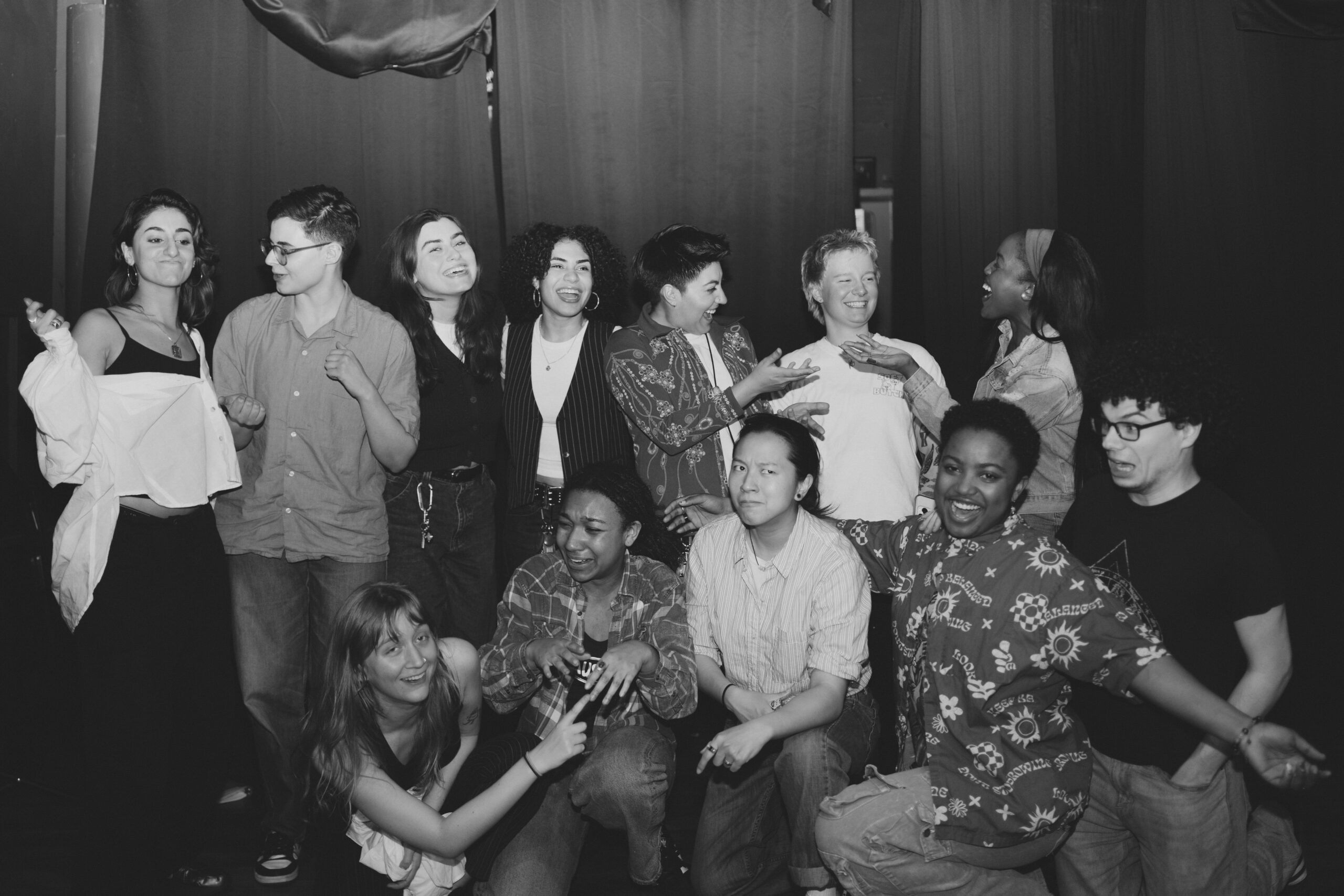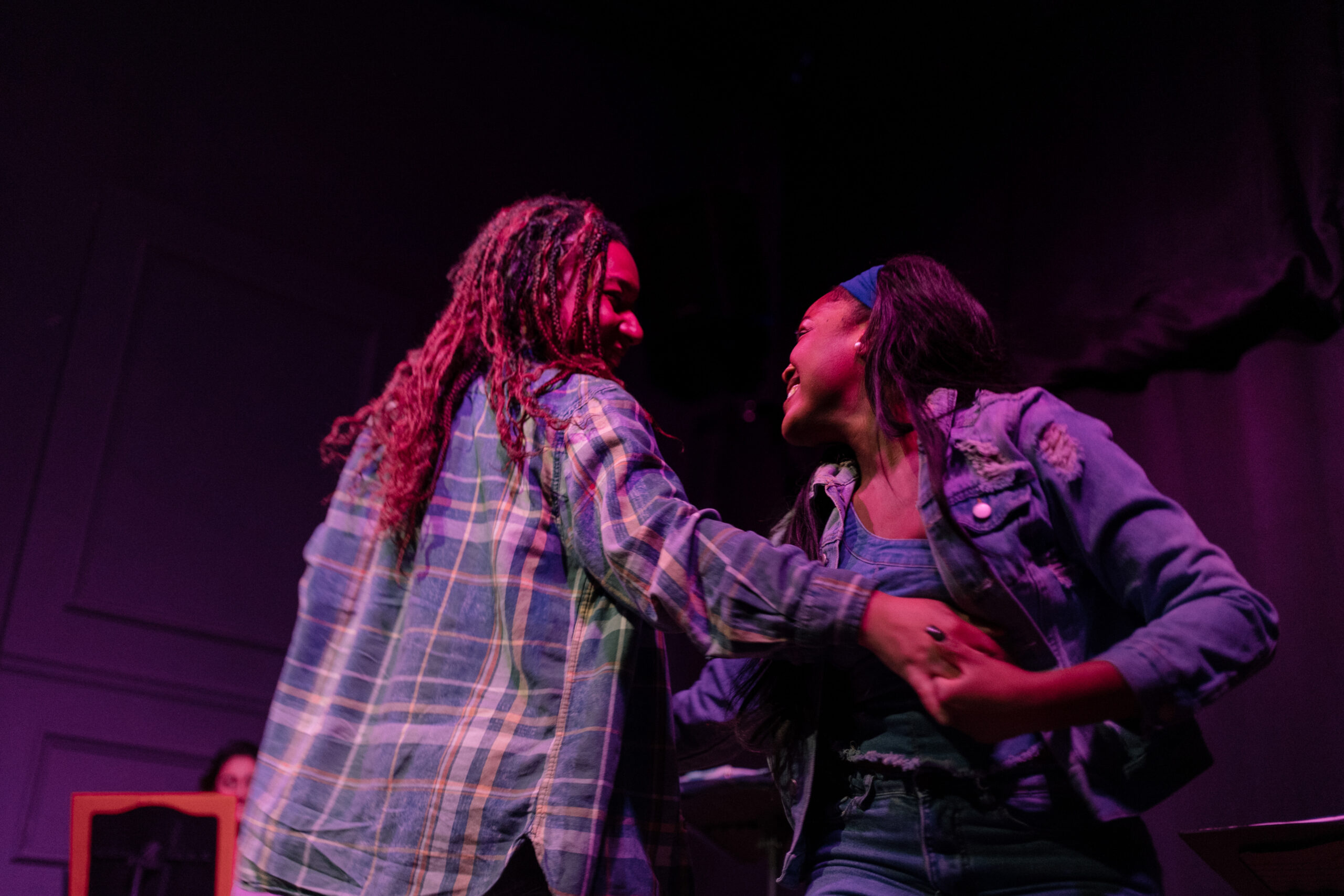The Village
Review: The Ghost of Leslie-Fucking-Feinberg +What Could’ve Been
By Cheyenne Edwards
It’s a dewy, drizzling night in Williamsburg, burdened by similar winds that brought Dorothy and Toto to Oz. Inside The Vino Theater, there’s a sea of queer and trans twentysomethings eagerly awaiting What Could’ve Been, written by Lu Davis, and The Ghost of Leslie-Fucking-Feinberg, written by Kaila Tacazon. These one-act plays are the evening stint of Chick Magnet, a new playwriting incubator helmed by Dyke Theater Co. Self-described as “theatre/art made by dykes, for dykes (and those who love them),” DTC was founded by Isa DeLeón García, an actor, playwright, and fellow survivor alum of the New York University Tisch. I sit comfortably in the second row with my friend Velvet as introductions are made and the first part of the production begins.
Set in 2010, What Could’ve Been chronicles a Black sapphic situationship between Cynthia (Kaa’lah Bynes), a closeted lesbian, and Magdalene (Serena Phillip), her “silently queer” roommate and lover. The play reckons with the self, queer desire, and the pain of growing apart. The lead actresses’ performances, directed by DeLeón García, are subtly powerful even when they’re sitting down. Bynes as Cynthia carries herself as full of secrets. Her fears surrounding her sexuality cost her a mutual sense of understanding and empathy with Magdalene, her girlfriend-who’s-not-her-girlfriend. While Phillip as Magdalene represents a more traditional bundle of nerves, Cynthia attempts to act more self-possessed than she actually is while Magdalene allows her heart to lead her through life. As Cynthia and Magdalene continue to navigate their complicated relationship, conflict brews when Magdalene seeks out the company of Vincent. The roommate of Cynthia’s beard, Anthony, who never appears on-screen in a very intentional way. In the end, there’s a choice on both sides: Will Cynthia overcome her anxieties and start loving Magdalene out loud, or will she remain in her comfortable closet? Will Magdalene remain stifled in their relationship or go where she’ll be loved in daylight hours?
Magdalene’s dilemma resonates with many queer women’s journeys of sexuality. Some identify as lesbians because of past trauma and poor experiences with men only to find themselves reminded that they do in fact carry attraction to men. Many people tend to weaponize this human experience to “prove” twisted narratives, such as lesbians needing a man to “fix” them or nonlesbian queer women being lesser than their lesbian counterparts for this attraction. What’s refreshing to see is that Magdalene doesn’t punish or disparage herself for her newfound male attraction. She holds her own hand in the situation and gives herself grace. For some of us—not all of us—sexuality is complex in ways we’re still unraveling as queer people. I don’t disagree with one character more than the other; I have great empathy for both. It’s evident that Cynthia loves Magdalene, but gets in her own way and blocks their shared happiness because of her desperation for comfort and stability. Magdalene loves Cynthia, but she needs to be loved out loud in a way Cynthia cannot afford. This is a testament both to Davis’ writing and the fact that Vincent just happened to be the person fit for the task of loving Magdalene out loud. A special shout-out goes to Jonathan Price for his performance of Vincent, the comedic standout of the trio, with his calculated body language and physicality.

Photo by Mattie Provost. Instagram: @maddieprovost2.0.
Top row (L to R): Anahita Monfared, Noma Mirny, Jaden Urso, Marvelyn Ramirez, Isa Garcia, Liv Campbell, Kaa’lah Bynes.
Bottom row (L to R): Aliza Cosgrove, Serena Phillip, Sabrina Lin, Essence Blake, Henry Alper.
The Ghost of Leslie-Fucking-Feinberg thrusts us back to 2025 and propels its audience into fits of laughter with each exchange between characters. Directed by Noma Mirny, it centers Zephyr, or Z (Essence Blake), a 19-year-old Afro-Latinx transmasc stoner who, with the rip of his bong, can summon the ghost of Leslie Feinberg, the eponymous trans rights activist and butch lesbian icon (Sabrina Lin). Feinberg acts as Z’s fairy goddyke in relaying advice on how to navigate their trans identity after ending a stifling micro-relationship with Leah (Aliza Cosgrove), a white radfem nonbinary lesbian. Blake is endearing, witty, and sympathetic as Z and does a supplemental job in his portrayal of a pothead for someone who’s admitted to never picking up a bong before. Special attention goes to Cosgrove as Leah, who brings a deliciously manic energy to her performance. Leah (they/she) spouts all the TERF (trans-exclusionary radical feminist) rhetoric, dressing it up in concern – How they like Z’s breasts, how other lesbians won’t be as attracted to him (to which Velvet shouted, “That’s a lie!” much to the audience’s delight).
Relevant (and terrifying) time period aside, The Ghost of Leslie-Fucking-Feinberg is a radical play. It is the first media production I’ve seen that seeks to unpack and challenge contemporary notions of queerness and transness. Z wants to get top surgery and start testosterone, but he hasn’t made any appointments to do so. Right after being served a breakup contract by Leah, he dives into another hookup with Lizzie (Erika Davis), an avid chaser (someone who pursues trans people romantically/sexually because of their trans identity). Leslie Feinberg bears witness to all of it and dishes Z some tough love: To live the life he desires, he must be serious about the life he lives in the present. Hedonism, at this point, is a subculture of queerness, as most of our events include the indulgence of drugs, alcohol, and hookups. The play touches on this by ending with Z forgoing his bong after meeting Lou (Mikey Bogardus), a transfemme activist. Community is healing.

Photo by Mattie Provost. Instagram: @mattieprovost2.0.
Left to Right: Serena Phillip, Kaa’lah Bynes.
Dyke Theater Co. is an authentic community effort, committed to highlighting lesbian art and expanding what that can look like. I’m only dismayed I couldn’t catch the matinee round, featuring the works of remaining Chick Magnet incubants Niqo Torrez, Elena Freck, and Jackie Heck. I had the pleasure of unknowingly sitting next to Lu Davis, who rightfully basked in the waves of applause after the show was over. In truth, both Davis—who, aside from supporting DeLeón García, brought me out of my house with the urge to support Tisch-grown Black lesbian talent—and DTC left me inspired. Though I’m not a playwright, I’m a screenwriter battling introversion and imposter syndrome. I, too, want to bless people with my evocative lesbian art! A significant barrier to this goal has been a lack of funds, a reality many talented filmmakers face. However, when it was announced that the show’s sales were sufficient to compensate the actors and writers, I felt joy for Isa, their partner Marvelyn, and everyone involved. People will show up, whether they know you or not, simply because they want to support your vision. As someone whose primary goal is to provide nuanced representation for their community, the Chick Magnet showcase was enough to drive me to pursue my passion in more flexible, community-driven ways.
•
Edited by Ava Emilione
It was such an honor to have you there Cheyenne! Thank you for this amazing review ❤️